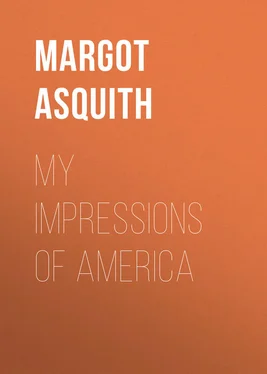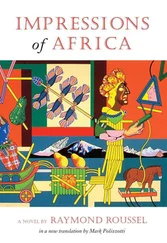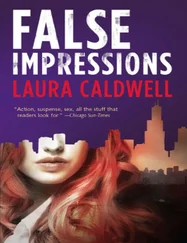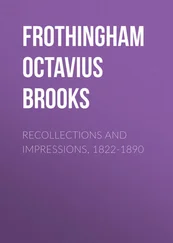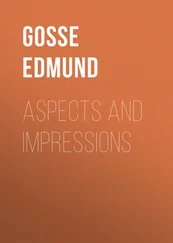Margot Asquith - My Impressions of America
Здесь есть возможность читать онлайн «Margot Asquith - My Impressions of America» — ознакомительный отрывок электронной книги совершенно бесплатно, а после прочтения отрывка купить полную версию. В некоторых случаях можно слушать аудио, скачать через торрент в формате fb2 и присутствует краткое содержание. ISBN: , Жанр: foreign_antique, foreign_prose, Путешествия и география, на английском языке. Описание произведения, (предисловие) а так же отзывы посетителей доступны на портале библиотеки ЛибКат.
- Название:My Impressions of America
- Автор:
- Жанр:
- Год:неизвестен
- ISBN:http://www.gutenberg.org/ebooks/31110
- Рейтинг книги:5 / 5. Голосов: 1
-
Избранное:Добавить в избранное
- Отзывы:
-
Ваша оценка:
- 100
- 1
- 2
- 3
- 4
- 5
My Impressions of America: краткое содержание, описание и аннотация
Предлагаем к чтению аннотацию, описание, краткое содержание или предисловие (зависит от того, что написал сам автор книги «My Impressions of America»). Если вы не нашли необходимую информацию о книге — напишите в комментариях, мы постараемся отыскать её.
My Impressions of America — читать онлайн ознакомительный отрывок
Ниже представлен текст книги, разбитый по страницам. Система сохранения места последней прочитанной страницы, позволяет с удобством читать онлайн бесплатно книгу «My Impressions of America», без необходимости каждый раз заново искать на чём Вы остановились. Поставьте закладку, и сможете в любой момент перейти на страницу, на которой закончили чтение.
Интервал:
Закладка:
The Library is a magnificent building, founded in 1852, containing over two million volumes, half of which are lent out for daily use at home. The architects of the building were McKim, Mead, & White of New York, but most of the design was the work of Charles Follen McKim. The mural decorations were painted by Puvis de Chavannes, Edwin Austin Abbey, and John Singer Sargent. As my time was limited I concentrated on the works of my friend Mr. Sargent.
It would be as impossible as it would be pretentious to attempt to describe the beauty of the Sargent Hall. It represents thirty years of thought and labour, and has a majesty of design, glory of drawing, and originality of conception unequalled by anything in Europe.
The "Hand-Maid of the Lord" on the east wall, holding the Divine Child in her arms, and "Our Lady of Sorrows," which faces it, fill your heart with wonder and your eyes with tears.
In the first, the Blessed Virgin is rising from a throne with her baby in her arms. You realise in looking at this Child that He is the Mighty God and Everlasting Father; and the expression on the face of the Virgin – more than of any other Madonna that I have ever seen – convinces you that she was not only the Mother of the Counsellor upon whose shoulders the Government would fall, but the Mother of the Prince of Peace.
The Virgin in "Our Lady of Sorrows" stands upon the crescent moon behind a row of lighted candles raised in relief of white, gold and silver. Her little face with wide-set eyes looks down upon you from an elaborate silver crown set against a radiant halo of fine and illusive design, and her two beautiful hands clasp to her heart the shining swords that typify the Seven Sorrows. The dignity of her pose, the submission and pathos of her haunting eyes waken you to a new sense of the majesty of pain. I felt, as I looked up, that I was sharing a common gratitude that such subjects should have captured the genius of the greatest living artist.
We went on from the Library to the Museum, where the decorations of the dome of the rotunda, to say nothing of the exterior of the buildings, are magnificent. Here Mr. John Sargent has surpassed himself.
I have heard critics, for want of something better to say, express the opinion that he is a finer painter than artist. If they have any doubt upon the subject, let them go to Boston, and if teachable, they will learn there that Sargent is not only a rare artist, but a poet and an architect.
Before leaving Boston City I received a call from Mrs. Bancroft, an old lady of eighty, with whom I made friends. She was extremely clever, and when she said I had both grace and genius I thought her an excellent judge! She told me I looked tired, and when we said good-bye, she gave me a bunch of wonderful flowers.
We motored from Boston to Worcester in the Fullers' car, and dined with Mr. and Mrs. Charles M. Thayer, and after an excellent dinner in good company, I delivered a lecture in the private house of Mr. and Mrs. Washburn, at which there were no reporters. Having implored my fellow guests at dinner to interrupt me in the drawing room – as I had never addressed this kind of party before – we opened a sort of debate which I thoroughly enjoyed. I doubt if any English audience, unless of old friends, would have asked such clever and amusing questions, and I knew as I answered back, by the feeling of life and laughter, that it had been a success, and went to bed without remembering the New York lady who had had enough of me.
IV: UNRESPONSIVE PHILADELPHIA
IV.
UNRESPONSIVE PHILADELPHIA
SERMON ON LIFE AS A TRAINING SCHOOL – MARGOT'S ENGLISH NOT UNDERSTOOD IN PHILADELPHIA – MRS. CORNELIUS VANDERBILT'S BAL POUDRÉ – PRAISE FROM HEYWOOD BROUN
ON Sunday, the 15th of February, Mr. and Mrs. Harry White took me to St. Bartholomew's, a modern church of great beauty. Dr. Parkes, a man of authority and eloquence, preached from the fourth chapter of Galatians, verse 6:
"And because ye are sons, God has sent forth the Spirit of His Son into your hearts."
I did not need to be a Scotch woman to listen to the sermon that he preached. He said that we were fellow students graduating from a great university, joined in the son-ship of Christ, and that we should cultivate a spiritual fellowship with man, since the highest personality could never develop by itself. That our names were entered at our baptism; we received our first diplomas at our confirmation; and the object and mission of the Church was to guide or coach us for the various tests that life would demand from us; and that we should always do what we could to help one another.
As I listened to the rector, knowing how easy I had found it in life to love and care for other people, I wondered how many things I had left undone, and what examination I could pass if suddenly called upon to compete. Haunted from early youth by the transitoriness and pathos of life, I was aware that it was not enough to say, "I am doing no harm," I ought to be testing myself daily, and asking what I was really achieving.
My attention having strayed from the sermon, I was glad to have it recalled by hearing Dr. Parkes say that most people preferred the jazz, the vaudeville, or the movies to the Church.
He said that he would step down for a moment into the pews and ask the pulpit why the services were conventional, monotonous and uninspiring; why the clergy gave unsuitable moral advice, warning the congregation of dangers to which they were not exposed; expressing opinions on politics which they did not share; and convincing them at the end of a tedious service that under no circumstances would they go oftener to church than they could possibly help.
"I will now return to the pulpit," he said; and I listened with close attention.
It was true, the Church was often dull; but the attitude of the congregation was wrong. They ought not to depend upon perpetual entertainment. People went to church for various reasons. Some from habit, some to set a good example, and a few with a yearning hope that they might hear something to heal their tortured minds; something to reassure them that since Jesus wept, He could not be far from those who mourned. Few men were orators, and what filled the churches were the sermons. People would tell you the service was enough, but it obviously was not; or the churches would be crowded every Sunday.
"I have no doubt," he continued, "that I could entertain you for a time; so could the choir and the fine organ, but I feel this would be wrong; it would be taking away from the meaning of the service, and the spiritual fellowship of man. Everyone ought to go to church, as otherwise the churches would cease to exist, and the most irreligious of men could hardly desire this. One day some young prophet or great disciple of Christ might come among us and find no place from where he could speak to the people, and no assemblage that he could address."
I went back to the hotel profoundly impressed by what I had heard and not in the humour to be interviewed by a Philadelphian reporter who was waiting to see me; but I found Mr. V. Hostetter both understanding and intelligent.
The next day I went to Philadelphia. The unresponsiveness of my large audience was more than made up for by the kindness of my chairman, Mr. George Gibbs, the hospitality of Mr. and Mrs. Thomas Ridgeway, and the friendliness of the reporters. I doubt if my English was understood, in spite of being informed that I could be heard plainly from the gallery. Except at my first lecture – when I could not stand – I have had no difficulty in making myself heard.
On my return to New York, after dining in bed, I joined my daughter at a bal poudré given by Mrs. Cornelius Vanderbilt, a clever New York hostess who thinks nothing of entertaining a hundred and fifty people at lunch, tea or dinner.
Читать дальшеИнтервал:
Закладка:
Похожие книги на «My Impressions of America»
Представляем Вашему вниманию похожие книги на «My Impressions of America» списком для выбора. Мы отобрали схожую по названию и смыслу литературу в надежде предоставить читателям больше вариантов отыскать новые, интересные, ещё непрочитанные произведения.
Обсуждение, отзывы о книге «My Impressions of America» и просто собственные мнения читателей. Оставьте ваши комментарии, напишите, что Вы думаете о произведении, его смысле или главных героях. Укажите что конкретно понравилось, а что нет, и почему Вы так считаете.
